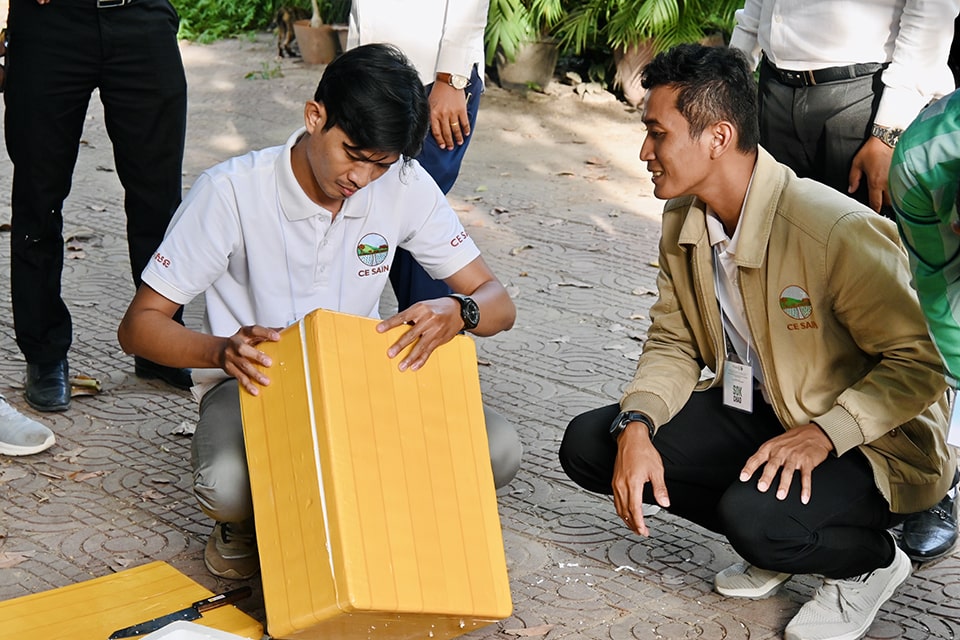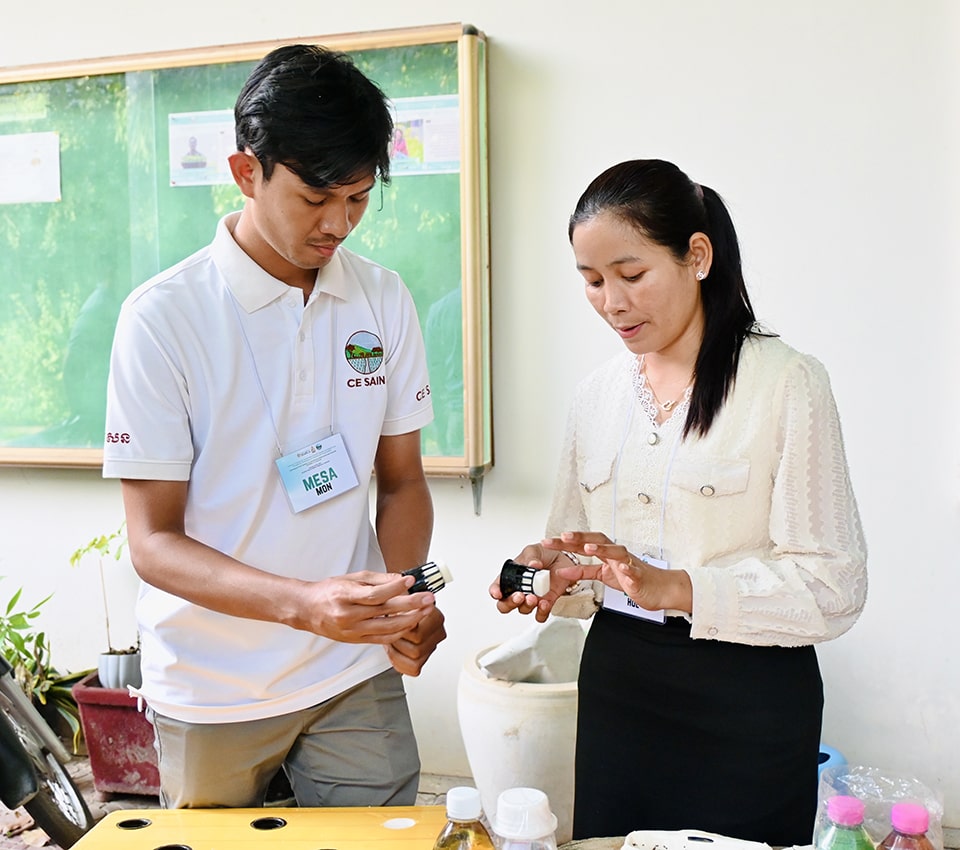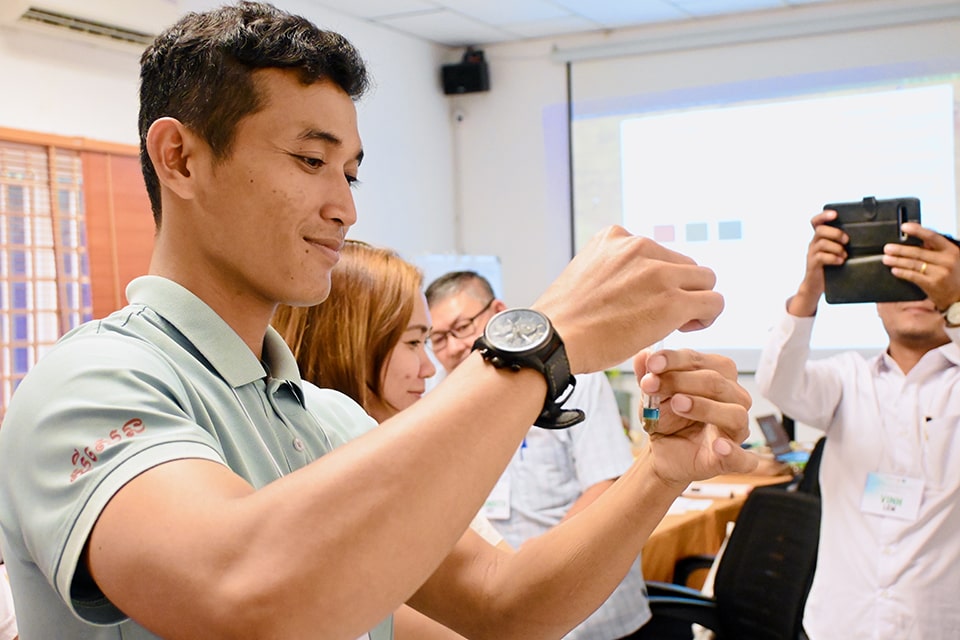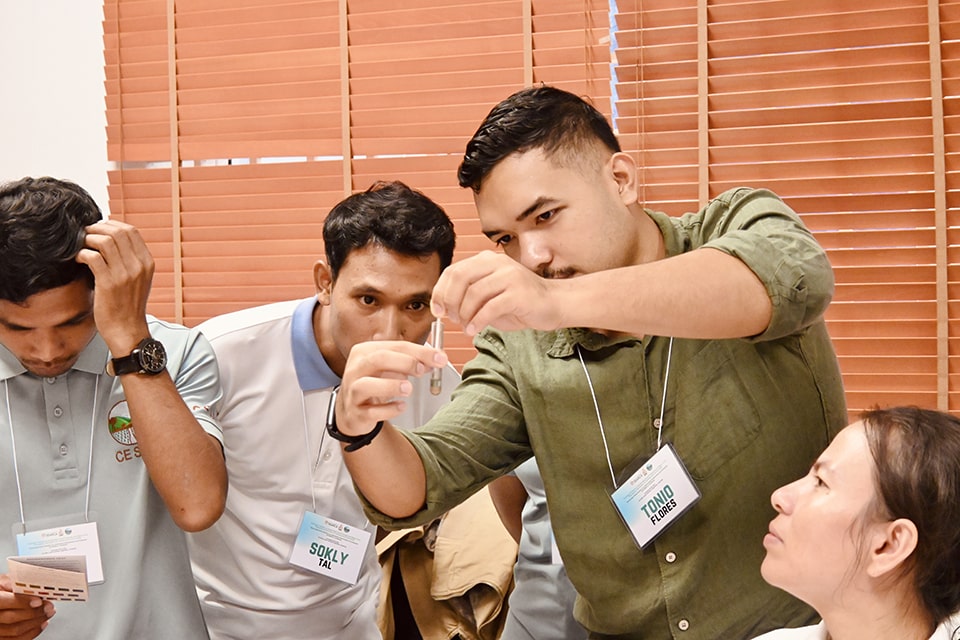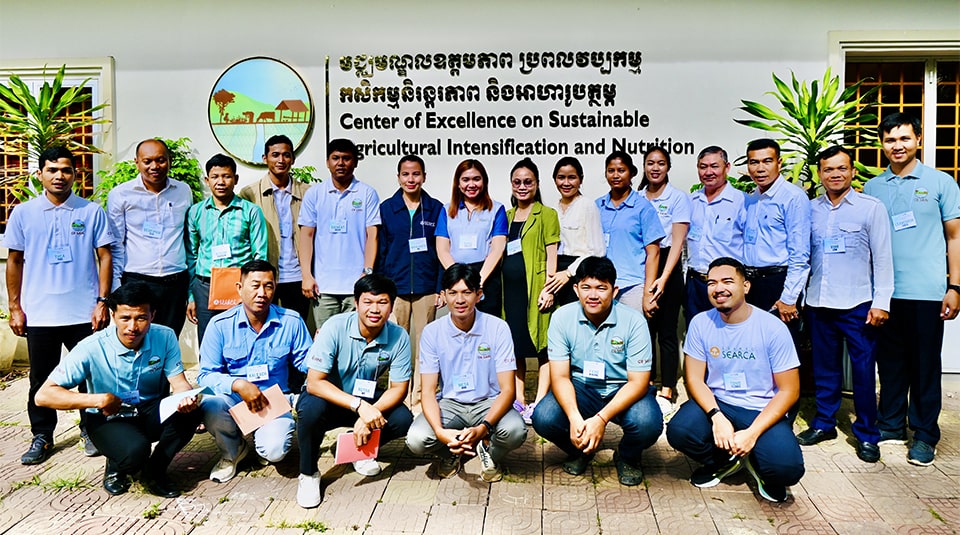 Participants and facilitators, along with Ms. Anna Gale Vallez, Program Specialist, and Mr. Antonio Flores II of FarmLab, during the training of trainers on Sustainable Food Production and Basic Food Processing held at the CE SAIN Office in Phnom Penh, Cambodia.
Participants and facilitators, along with Ms. Anna Gale Vallez, Program Specialist, and Mr. Antonio Flores II of FarmLab, during the training of trainers on Sustainable Food Production and Basic Food Processing held at the CE SAIN Office in Phnom Penh, Cambodia.
PHNOM PENH, Cambodia – The Southeast Asian Regional Center for Graduate Study and Research in Agriculture (SEARCA) and the Center of Excellence on Sustainable Agricultural Intensification and Nutrition (CE SAIN), in line with the commitment to advance sustainable agricultural practices and improving food and nutritional security in Cambodia, conducted a training program on Sustainable Food Production and Basic Food Processing on 26–28 November 2024 at the CE SAIN Office in the Royal University of Agriculture (RUA). It was attended by 22 participants, comprising agricultural coordinators and agricultural extension officers of the Agricultural Technology Parks (ATPs), teachers, school heads, and principals of the pilot schools.
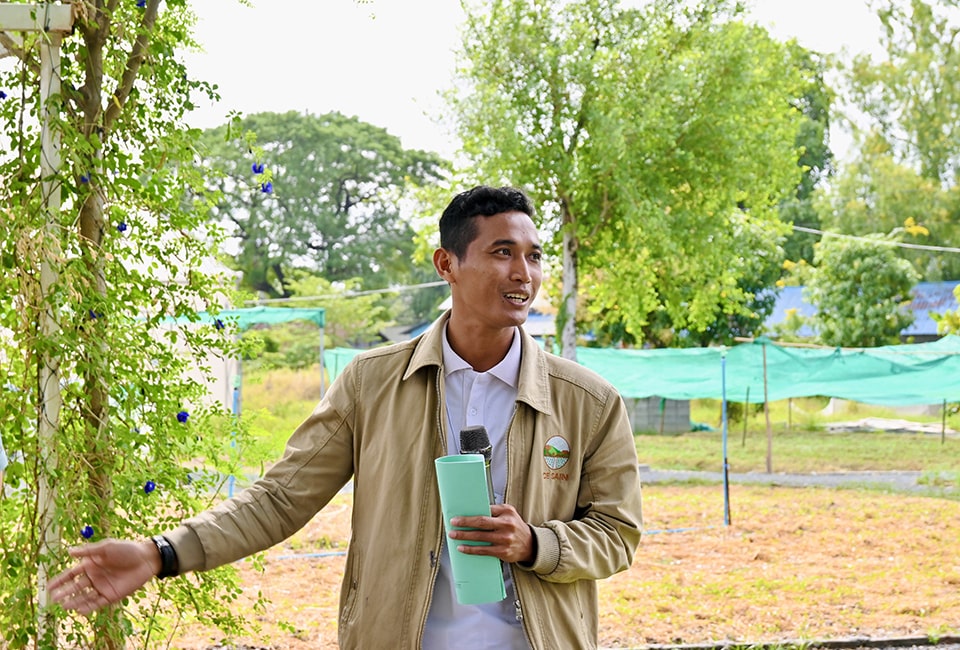 Mr. Chao Sok, Provincial Agricultural Coordinator of CE SAIN, conducted a guided tour of the Agricultural Technology Park (ATP) in Phnom Penh, Cambodia.
Mr. Chao Sok, Provincial Agricultural Coordinator of CE SAIN, conducted a guided tour of the Agricultural Technology Park (ATP) in Phnom Penh, Cambodia.
Adopting a systems-based approach, the program aims to develop a school-based farming initiative that promotes sustainable resource utilization, produces high-quality agricultural products, and fosters biodiversity conservation. It encompasses capacity-building sessions for community members and the establishment of fully operational ATPs. These gardens are designed to supply nutritious food while creating entrepreneurial opportunities for program stakeholders.
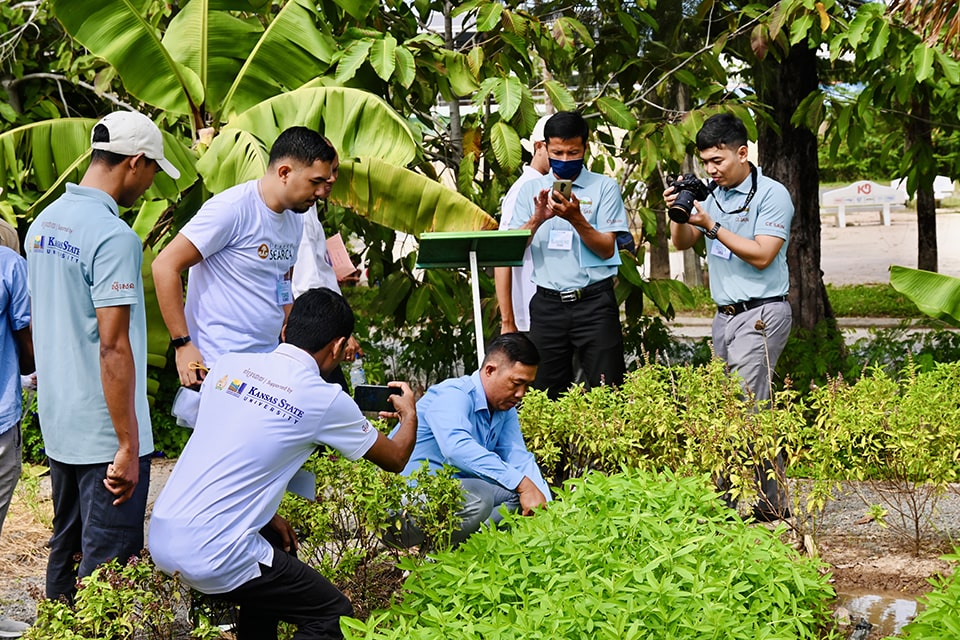 Participants collect soil samples to analyze the nutrient content present in the soil.
Participants collect soil samples to analyze the nutrient content present in the soil.
The program began with an orientation session, followed by a guided tour of the ATP at RUA. This was complemented by a knowledge-sharing session aimed at aligning participants' understanding and exchanging best practices related to gardening and the management of ATPs. This was succeeded by a comprehensive series of lectures encompassing various topics, including an introduction to agroecology and sustainable food production practices, seed sowing, transplanting, and other technologies such as soil sampling and hydroponics. These sessions provided participants with foundational knowledge and practical insights into the essential aspects of sustainable agricultural practices.
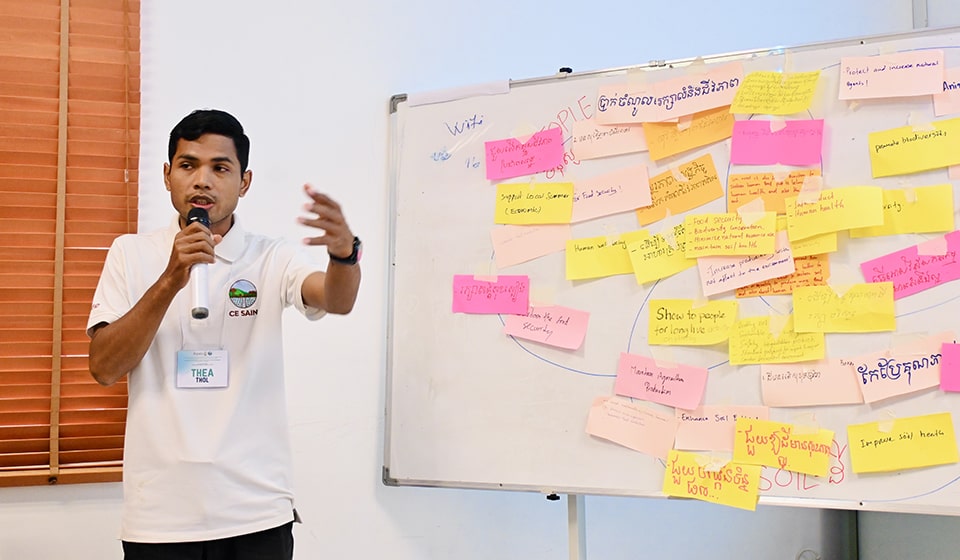 Mr. Tol Thea, Provincial Agricultural Coordinator of CE SAIN, during the leveling-off of the knowledge session.
Mr. Tol Thea, Provincial Agricultural Coordinator of CE SAIN, during the leveling-off of the knowledge session.
Participants during the preparation of necessary materials for establishing a hydroponic system utilizing the SNAP Hydroponic Nutrient Solution.
The second day commenced with insightful lectures on Waste to Wealth. These discussions encompassed various aspects of waste management, including nutrient cycling, water recycling, waste minimization strategies, and composting methodologies. Additionally, preparing nutrient-rich concoctions was introduced as part of sustainable practices.
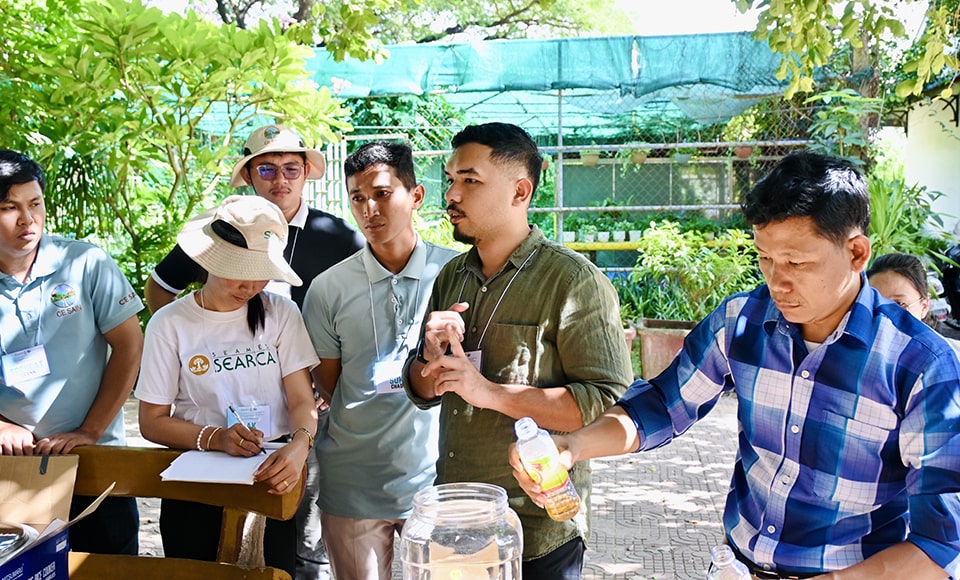 Mr. Antonio Flores II of FarmLab delivered a lecture on preparing the calcium phosphate concoction.
Mr. Antonio Flores II of FarmLab delivered a lecture on preparing the calcium phosphate concoction.
Following the lectures, participants engaged in hands-on activities on preparing concoctions such as calcium phosphate from eggshells, indigenous microorganisms (IMO) from cooked rice, and oriental herb nutrients (OHN). These hands-on activities reinforced the principles of sustainable agriculture and effective resource utilization. This was followed by a lecture on seed saving, emphasizing its importance from economic, sociocultural, and scientific considerations. The discussion covered various aspects of seed saving, including selecting appropriate varieties and specimens, techniques for seed extraction, proper labeling and storage methods, and in-situ seed conservation practices.
The third day began with a comprehensive session on vegetable production techniques and various crop cultivation methods. These included techniques for growing leafy greens from cuttings and seeds and cultivating solanaceous crops, root crops, vining crops, legumes, flowers, and herbs. The discussions provided participants with theoretical knowledge and practical insights for sustainable vegetable production. A lecture on garden ecology was delivered, highlighting critical concepts such as agrobiodiversity, ecological succession, nutrient management, and integrated pest and disease management. This session emphasized the importance of maintaining ecological balance within agricultural systems to ensure productivity.
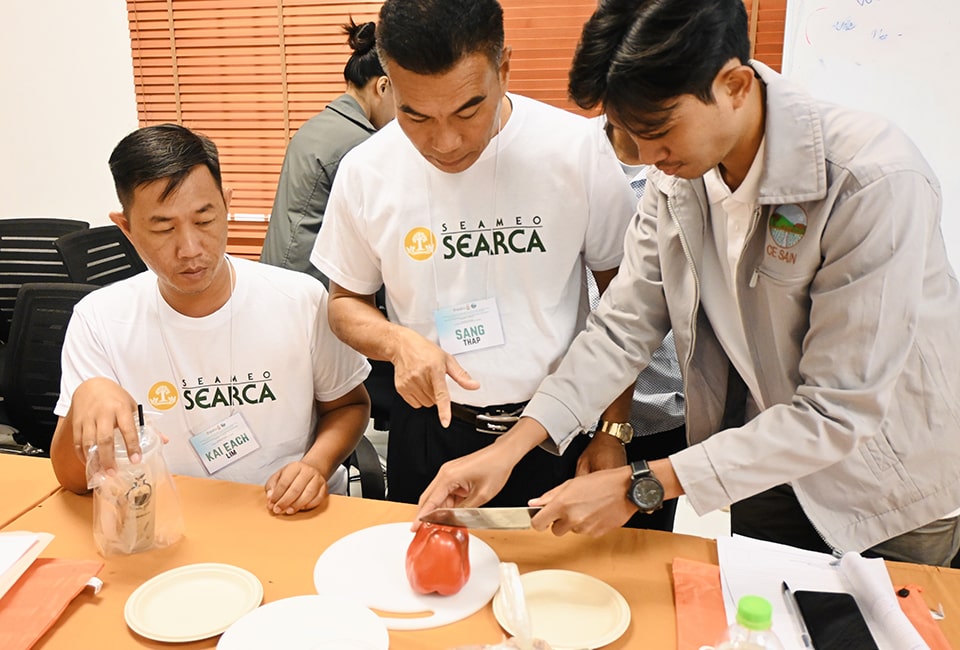 Participants actively prepared the ingredients during the hands-on activity on seed-saving
Participants actively prepared the ingredients during the hands-on activity on seed-saving
The activities continued with a lecture on Basic Food Processing, focusing on essential topics such as food safety and developing value-added products. Participants were introduced to techniques for creating pickled goods, jams, and fermented products, showcasing the potential for maximizing agricultural produce while ensuring its safety and extending shelf life. These sessions gave participants valuable knowledge to enhance their farming practices and postharvest management. This was followed by a hands-on activity involving the preparation of fermented vegetables and fruit jam. The participants were divided into two groups, one focusing on making jam and the other on preparing fermented vegetables. This practical exercise aimed at enhancing the participants' skills in value addition, enabling them to maximize the utility and market potential of the produce harvested from their ATPs.
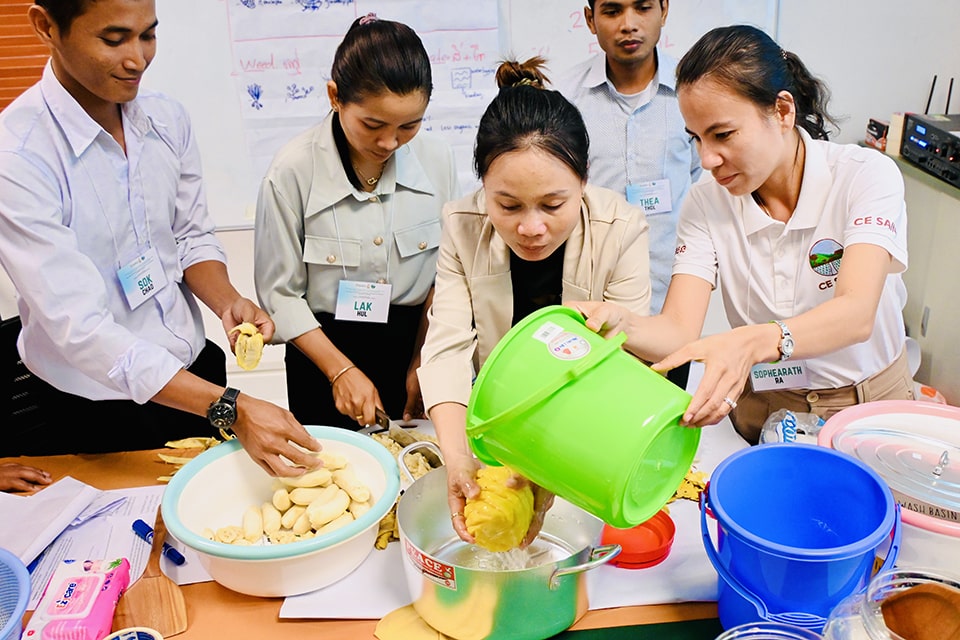 Participants actively prepared the ingredients during the hands-on activity, which focused on vegetable fermentation and jam-making.
Participants actively prepared the ingredients during the hands-on activity, which focused on vegetable fermentation and jam-making.
The program concluded with participants engaging in a reflective session, sharing insights and takeaways from their workshop experience. This session was designed to provide a platform for participants to reflect on their learning, share their perspectives, and suggest areas for improvement. Their feedback will be instrumental in enhancing future iterations of the program. This was followed by a collaborative discussion to map out the next steps for developing and improving their community gardens. Participants identified actionable strategies to apply the knowledge and skills acquired during the workshop, focusing on sustainable practices, resource optimization, and community involvement to ensure the long-term success of their initiatives. It has also been announced a possibility of organizing an additional workshop scheduled for early next year, which will focus on the socioeconomic aspect of the Participatory Action Research on Integrating the School-plus-Home Gardens Cum Biodiversity Enhancement and Enterprise (SHGBEE) for the Improvement of Agricultural Technology Parks (ATPs) and Mini-ATPs in Cambodia.
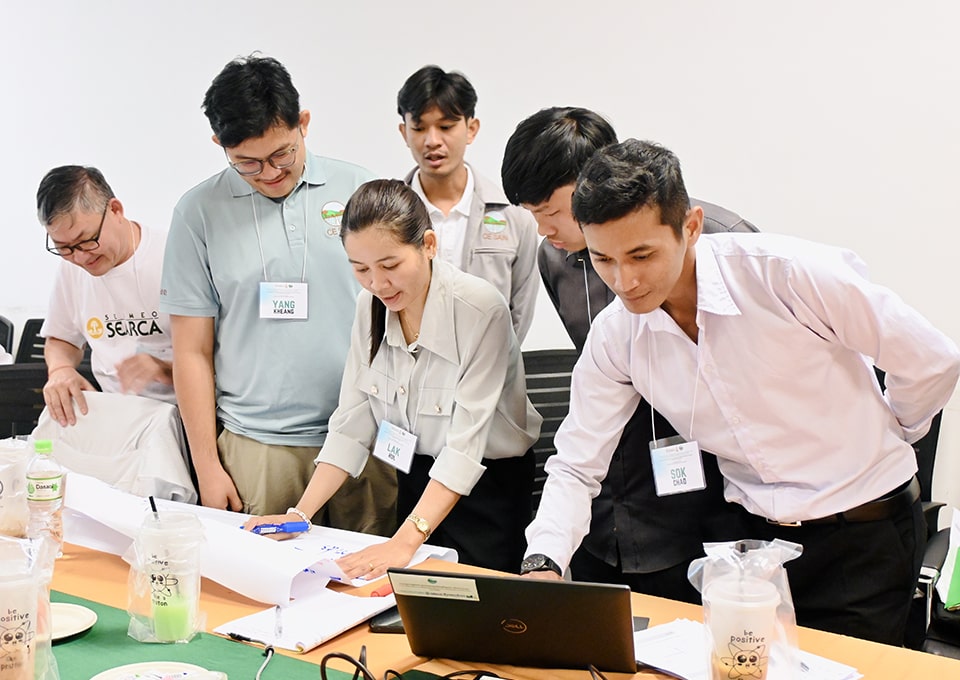 Participants during the mapping out of the next steps moving forward with their community gardens.
Participants during the mapping out of the next steps moving forward with their community gardens.
